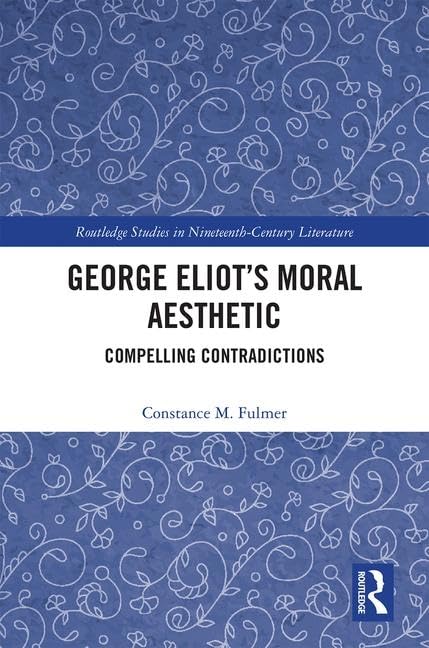George Eliot’s Moral Aesthetic: Compelling Contradictions (Routledge Studies in Nineteenth Century Literature)
George Eliot’s Moral Aesthetic: Compelling Contradictions (Routledge Studies in Nineteenth Century Literature) is backordered and will ship as soon as it is back in stock.
Couldn't load pickup availability
Genuine Products Guarantee
Genuine Products Guarantee
We guarantee 100% genuine products, and if proven otherwise, we will compensate you with 10 times the product's cost.
Delivery and Shipping
Delivery and Shipping
Products are generally ready for dispatch within 1 day and typically reach you in 3 to 5 days.
Book Details
-
Author: Constance Fulmer
-
Brand: Routledge
-
Edition: 1
-
Binding: Hardcover
-
Format: Import
-
Number of Pages: 192
-
Release Date: 20-11-2018
-
ISBN: 9781138579712
-
Package Dimensions: 9.3 x 6.3 x 0.7 inches
-
Languages: English
About the Book
George Eliot’s Moral Aesthetic by Constance Fulmer investigates the intriguing contradictions in the life and work of George Eliot. Known for her deep intellectual exploration of morality, Eliot continued to preach her own version of morality even after losing her faith in traditional Christian beliefs. She renounced the conventional Christian idea of heaven, yet she maintained hope for a form of immortality that would allow her to influence future generations through her writing. This paradox, along with others in her life, is explored in Fulmer's comprehensive analysis.
The book focuses on George Eliot's moral philosophy and artistic principles, revealing how they are intricately tied to her literary work. Fulmer's study examines how Eliot's self-concept shaped her narrative choices, and how the ethical dilemmas faced by her characters reflect her beliefs. It also discusses Eliot's complex use of symbols and imagery, such as animals, mirrors, windows, jewelry, and wills, in both her poetry and novels, which serve as tangible representations of her ethical ideas.
Key Features:
-
Exploration of Ethical and Artistic Principles: The book uncovers the relationship between Eliot’s moral philosophy and her writing, asserting that her artistic decisions were deeply influenced by her personal ethics.
-
Character and Circumstances: It explores how Eliot's characters, particularly clerical figures, musicians, and politicians, reflect her moral principles and the challenges they face in her narratives.
-
Use of Symbolism: Fulmer delves into Eliot’s use of tangible symbols to express philosophical ideas, such as animals and mirrors, enhancing readers' understanding of her moral aesthetic.
-
Paradoxes in Eliot’s Life and Work: The study illuminates the contradictions in Eliot’s life—such as her rejection of traditional Christian beliefs while continuing to advocate for moral progress and personal growth.
Review
George Eliot’s Moral Aesthetic is a thoughtful and insightful study that offers a deep dive into the ethical underpinnings of George Eliot’s literary works. Constance Fulmer deftly examines the moral dilemmas faced by Eliot’s characters and how these decisions align with the author's philosophical beliefs. This book is an essential read for students of English literature, particularly those interested in the intersections of morality, philosophy, and literature in Eliot's works. It also offers a compelling perspective on the ways in which Eliot’s personal struggles and moral convictions informed the artistry and depth of her storytelling.





